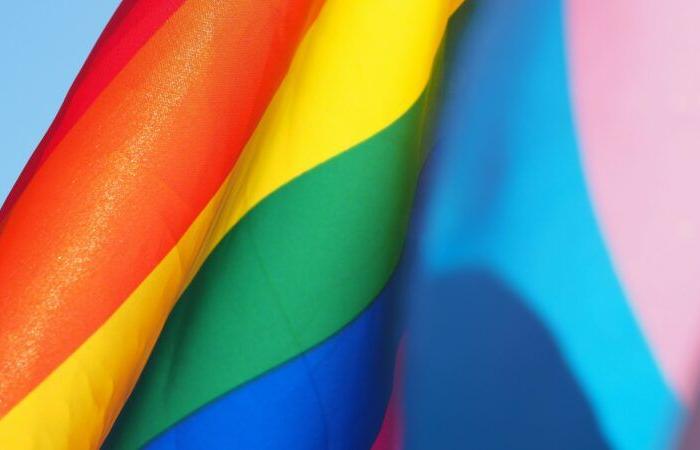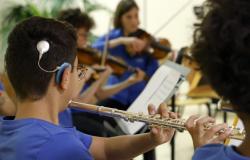This article was written by Arina Ruble and published in Russian by Novaya Vkladka on August 7, 2024. An edited version is published on Global Voices with permission of the author.
How life has changed for queer people in different regions of Russia after the ban on LGBTQ+ “movements”. What are they afraid of and what do they dream of?
All names have been changed for security reasons.
Music in the city of Tomsk
Anya and Nastya are musicians who play in bars and clubs in Tomsk. They met 5 years ago. At that point, Anya was curious to know more about the LGBTQ+ community: “I always tried to understand what was wrong with them, what was broken. » Anya fell in love with Nastya about a year after Russia’s invasion of Ukraine began, but didn’t declare her feelings until fall 2023: “We were able to date and even date before the law [dénonçant la communauté LGBTQ+ comme organisation extrémiste] is not adopted. » Anya’s mother accepted their relationship, but Nastya’s parents don’t know anything about Anya.
Anya and Nastya do not feel safe on the city streets, and are only intimate at home, away from the eyes of Anya’s son.
“We keep our feelings to ourselves and we are used to them,” Nastya says casually. “I’m really afraid of persecution and going to prison. I want more than anything to be free. And I also hoped Anya’s son would know about us. » Anya plans to tell her son everything when he turns 10. She believes he will then be mature enough.
Just like Nastya, Anya doesn’t want to leave the city. In Tomsk, her relatives help her take care of her child, but most importantly, she loves her work: “I’m finally making music, like I always wanted. I’m not ready to give up on this. »
“We can do whatever we want to people who are invisible”
Ayan, 34, is a doctor like his parents who live in an urban area, and according to him, are liberal and supportive, especially his mother. Ayan discovered he liked boys when he was 14. Except that in Buryatia, Ayan “did not have the opportunity” to meet someone like him. Her only option was to do online dating.
Ayan currently lives and works in Moscow. His colleagues and neighbors do not know that he is homosexual. That’s one of the benefits of living in a big city: “People get tired of each other and don’t care,” he says.
Ayan believes that discrimination against LGBTQ+ people aims to “exclude people from the field of information to make them invisible”. And we can do whatever we want to people who are invisible.
According to him, free art disappeared from his world after November 2023. He loves films and series but we no longer find any about the lives of queer people. Everything, even that which is indirectly linked to LGBTQ+ themes, has disappeared from the cultural agenda.
Ayan also realized that he has no future. He always wanted to have a child. He believes that “even if Putin dies tomorrow” and the war ends, attitudes towards the LGBTQ+ community will not change.
“The situation is getting scary”
Mark is 21 years old and a transsexual. He lives in the Novosibirsk region with his grandparents, his husband, and his dog. He works in a tobacco shop where he sells electronic cigarettes: “They banned me; soon they will ban my work too. What an incredible coincidence. »
Mark says he always identified as a man, but his mother chose to ignore the situation.
A month before the LGBTQ+ community was labeled an extremist organization, Mark received his new passport with his new name. As he says, “I managed to catch the last train.” »
Before that, he and his future husband, aged 19 and also named Mark, received medical evaluations which, until November 2023, authorized them to undergo gender reassignment surgery and undergo hormonal therapy. But these evaluations are no longer useful now, “because of the new law, we can neither do hormonal therapy nor undergo surgery. » Ultimately, Mark decided not to change his passport and to officially remain a woman so that the couple could register their union.
In the city, Mark goes unnoticed, he doesn’t seem extravagant. He looks more like Daniel Radcliffe in Harry Potter than a flamboyant character. When a reporter asks him if the local population became aggressive after the law was passed, Mark responds that residents have always been against queer people.
His companion speaks cautiously and with an unhappy air about the hostility of people which affects him deeply. He works with the Vyhod Group, which provides psychological and legal support to LGBTQ+ people.
“I fear we will be crushed by the wheels of history”
Heinrich and Tel are both transsexuals. They have been together for 5 years and hope to get married one day. Both still have their married names on their passports.
Both Heinrich and Tel suffered sexual violence from family members, and were beaten and harassed. Heinrich now works as a logistics specialist, and Tel is a doctor. Their colleagues are unaware that they are transsexual and neither has kept in touch with their parents.
Ten years ago, Heinrich believed that same-sex marriage would be possible in Russia. There were large LGBTQ+ communities and gay-friendly institutions in Moscow, and everything seemed to be more or less okay.
Someone thinks differently. Since he realized and accepted his transsexuality, “he has not lived a single day in peace”.
Despite their fear, fatigue, and skepticism, they both volunteer to help queer people with daily and health issues, find shelter, and provide legal consultations. “Standing around and waiting for it to happen is not for us. I can’t stand inaction. If we do nothing, nothing will change,” says Heinrich.
“I’m afraid that we will be crushed by the wheels of history, me, my husband and our friends,” worries Tel.
“There are many of usand we are strong »
Violetta is transgender. She began her transition shortly after November 30, 2023. Without a medical certificate, surgery, or change of passport, Violetta moved away from her parents. They are not aware of his transition.
Violetta is currently working on a media project with her colleagues to help LGBTQ+ people secure their information.
After he came out, many of his friends stopped talking to him “within a week.” The community of people like her provided much-needed support. “There are many of us, and we are strong, despite attempts to oppress us,” says Violetta.
Before November 30, 2023, Violetta was not interested in activism. The new law led her to stand alongside her community and assist those who remained in Russia. She now carries out security audits for organizations associated with vulnerable minorities.
Violetta adds: “The government can dictate whatever it wants. Tomorrow they might ban sandals, saying they are a sign of the extremist sandal wearers organization, for example. And who will oppose them? Person. »
The struggle for recognition and understanding deepens tensions in societies where hatred and prejudice dominate tolerance. Not to mention situations where the main enemy is the State. Almost everyone cited in this article is considering leaving the country. As Tel says: “Because I’m afraid of living my whole life without being free. »






